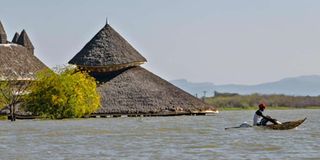Premium
The time to act to save the planet is now

A local fisherman paddles a traditional raft made from reeds past one of the submerged buildings of the Soi Lodge on the shores of Lake Baringo on October 6, 2020.
In Isiolo six weeks ago, I spoke to people in Shambani, just one community from a county at the forefront of a drought that is affecting over 2.1 million people. They knew that keeping their animals there for pasture could destroy the environment they rely on. But they had no choice, like many communities who face a harsh fight to survive.
The people of Shambani showed me how climate change is a daily reality here in Kenya and across East Africa. It was clear to see. Despite bearing almost none of the historic responsibility for the carbon emissions which have caused climate change, Kenya is one of the most vulnerable countries in the world to its effects.
Nations like the UK have reaped the benefits of industrialisation and pollution for generations — there is no shying away from that. Now we have a duty to support developing countries grow their economies and create jobs in a green and sustainable way — and adapt to the very real impacts of climate. For me, this is about fulfilling our obligation as a wealthy nation, which has over the centuries contributed to the climate change we face now.
That is true here in Kenya and globally. In the last three years, the UK has spent Sh22 billion on helping tackle climate change in Kenya, and we have committed to doubling the amount we spend combatting climate change globally in developing countries. We are also pushing other developed countries to do their duty and deliver the Sh4 trillion of climate finance that was pledged to the world’s poorest six years ago in Paris.
Climate change
Tomorrow, that effort goes up a gear with the start of a climate change conference in Glasgow — COP26 — a turning point for humanity. This is the biggest ever summit in the UK, with around 10,000 attendees and 140 world leaders, including President Kenyatta. It is the moment to take collective action on the biggest issue facing our generation.
Climate change is central to Kenya and the UK’s friendship. Last November we launched a joint Year of Climate Action in the run up to COP26. In the 12 months since, I have seen the destruction from the rising of Lake Baringo, the people and pastures affected by the drought facing Northern counties, and communities in Kibera at the sharp end of climate change.
The science tells us that even if we stop emissions today, extreme events will become even more common. Droughts and flooding which devastate lives and lead to conflict for resources will get worse, and a warmer Kenya means the central highlands could become malaria-endemic zones. Kenya’s precious wildlife will decrease in numbers.
But I have also seen hope. That hope is driven by Kenya and Kenyans leading the country to adapt to climate change. From Isiolo to Baringo, Mandera to Kwale, I have met with activists who are championing climate action. We all have a lot to learn from Kenya, powered almost exclusively by renewable energy, a model for the rest of the world.
We have a duty to support Kenya as much as we can where it needs or asks for our partnership. There are many fantastic examples of what our Sh22 billion has achieved in tackling climate change over the last three years. From Faith in Kibera who is using Met Office data to run climate alert radio shows, to backing Kenya’s standout renewable projects like Malindi Solar, supporting Eliud Kipchoge’s forest in Kaptagat, helping set up Nairobi’s first recycling plant, developing super crops that grow in all conditions, and cash transfers for communities on the front line of climate change.
Droughts
But we know more must be done. That’s why the focus of our COP26 Presidency has been advocating for global action to help countries prepare for the inevitable impacts of climate change.
So what do the next two weeks mean for wananchi? They mean changing the course of the future for farmers facing crop losses because of the droughts and floods, ensuring food and resource security, ensuring that families don’t have to relocate because water levels rise, and halting and reversing the decrease in Kenya’s forest cover.
To do that, the headline goals are to keep the planet’s temperature below 1.5 degrees, make adaptation a daily reality and close the finance gap. That’s why hitting the global Sh4 trillion of climate finance per year target is so important. COP26 is an opportunity, as we address the most pressing issue of our time, to protect Kenya’s forests, her lakes, her pastures and thus her people. This is the time to act.
Jane Marriott is UK High Commissioner to Kenya. @JaneMarriottUK





